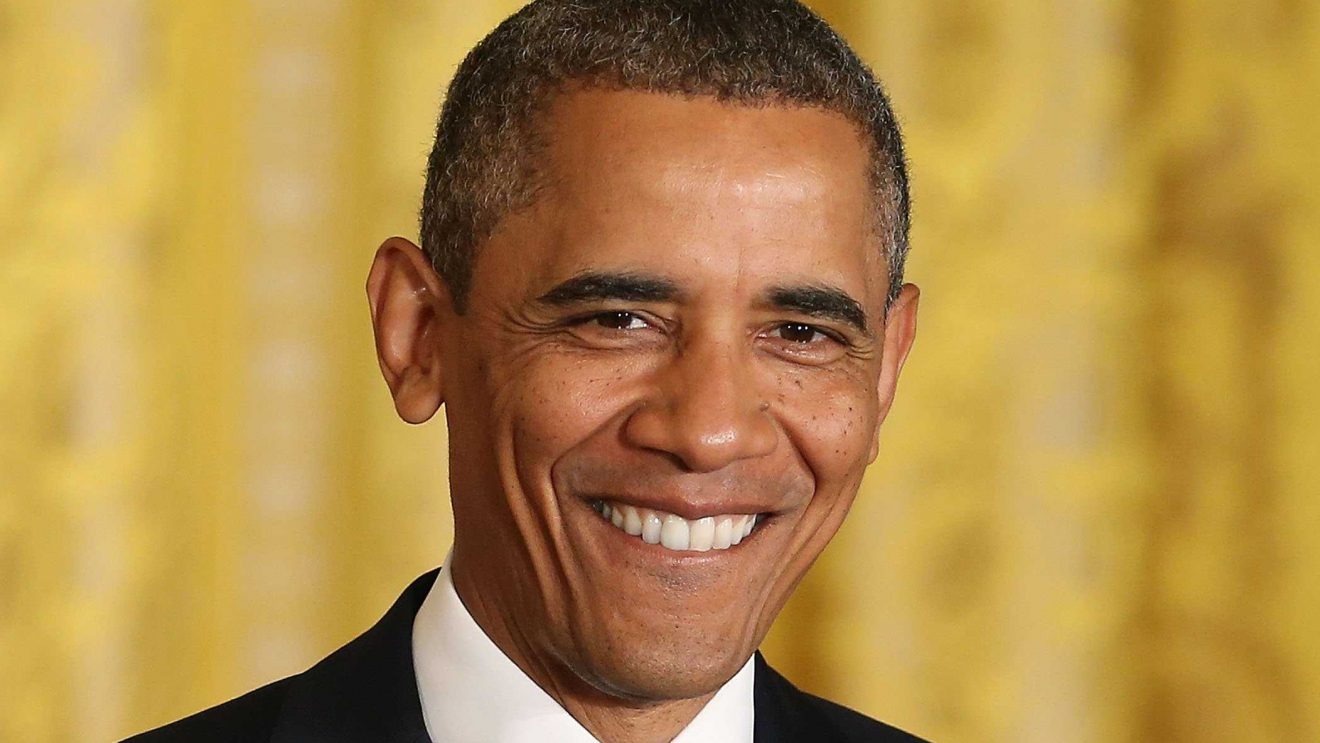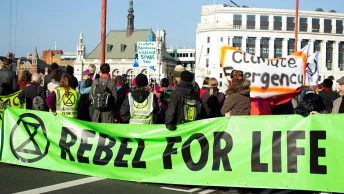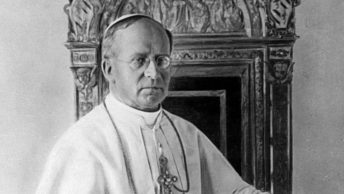Speaking at his first inaugural address, Barack Obama promised to bend “the arc of history … Now, there are some who question the scale of our ambitions, who suggest that our system cannot tolerate too many big plans … what the cynics fail to understand is that the ground has shifted beneath them, that the stale political arguments that have consumed us no longer apply.” He promised transformation that went beyond the United States, or any single nation, to global change. Underlying his faith in transformation, Obama uses a secular rhetoric of “social justice.”
Obama still frames environmental and economic regulation, health care, redistribution of wealth and gay marriage in terms of “fairness” and “justice.” His effective appeal to social justice resonates with a nation that has become increasingly secular. We have forgotten, it seems, that the Christian message of social justice provided the foundation on which our representative republic was built—the recognition to the right to life, liberty and the pursuit of happiness derived from natural law imparted by God’s creation of a well-ordered universe.
Christ’s message of social justice transformed the world. As this message took root in the Western world, slavery ended; women gained equality and respect; people’s rights were recognized; and representative government developed.
Left-Wing Social Justice
Today’s left speaks of “social justice,” but without God or the Christian principles that are the foundation of the American republic. Instead, the left uses the rhetoric of social justice to espouse greater government control of our lives in ways that subvert our liberties as a nation and our freedom as a people living in a representative democracy. The left today distorts our long-time understanding of what true justice means, based on Judeo-Christian principles. The leftist message beguiles the public by tapping into our natural inclination to help the poor, respect all humans as equal in God’s eyes, and act toward others as thy brother’s keeper.
Exactly what leftists mean by “social justice” is never clear. It’s an appeal to the heart and good intentions of the American people. The banner of social justice, as held up by today’s left, has attracted many Americans concerned about legitimate problems related to poverty, environmental pollution, health care and corporate abuse. Yet behind this rhetoric rests a reliance on governmental power, a faith in political and corporate elites to determine the collective good, and a deep hostility to free markets. The left calls for new standards of public morality to be built on this vague concept of social justice in which individual rights are subordinated to the collective interests of the community— as defined by bureaucrats in Washington and a political class that dominates the Democratic Party today.
This new public morality, operating under the guise of social justice, seeks to redistribute wealth through the expansion of the entitlement state, but it does not stop there. The left’s agenda involves determining how all citizens live their lives; what constitutes a family; how their children are raised and what they are taught; how much energy they consume; the health-care plans they purchase; the cars they buy; the light bulbs they use; and even what they eat and drink. Behind the grab bag of causes—radical environmentalism, abortion rights, national health care, feminism, business and financial regulations, assisted suicide, sex education, caps on energy— rests a single goal: the transformation of America into a nation run by a governmental elite from the top down. When Americans cannot be cajoled by the rhetoric of social justice, the left displays its natural tendency to use coercion through legislation, the courts and governmental bureaucracies to ensure that its agenda is fulfilled.
Make no mistake: The left seeks to transform America by replacing natural law and man’s inalienable rights derived from a well-ordered universe created by our Creator, with man-made law determined by a self-appointed elite. The left’s social justice agenda is broad, encompassing a myriad of issues. Let’s explore just three manifestations of left-wing conceptions of social justice—radical environmentalism, abortion and assisted suicide, and nationalized healthcare —and contrast them with traditional principles of Christian social justice.
Environmental ‘Justice’
The left’s agenda to transform America finds ready display in its call for “environmental justice.” On the eve of Barack Obama’s election in 2008, Al Gore captured the radical perspective of militant environmentalism when he declared in his foreword to Bill McKibben’s edited collection American Earth: Environmental Writing Since Thoreau, “We can find the wisdom and spirit we need to disenthrall ourselves and fulfill what is perhaps our ultimate manifest destiny: to save our planet.”
What is the “wisdom” and “spirit” that Gore urges Americans to accept in order to “save the planet”? The wisdom is derived from scientific evidence that has been disputed within the scientific community. The spirit he speaks of is more elusive, but he clearly suggests that our spirit is best expressed in elite opinion embodied in people such as him. His message is that Americans overconsume energy, natural resources, foods and goods. The result, in his eyes, is an ecological crisis of cataclysmic magnitude that can be compared only to the end of the Cretaceous period 61 million years ago, when dinosaurs became extinct. The planet can only be saved through a total transformation of the American and global economy. If average Americans do not heed the message, then draconian steps by the federal government and world governments are required.
These steps include federal mandates, bureaucratic regulations, and taxes to control consumption and energy production. International treaties are necessitated to reduce carbon emissions and protect the oceans through international agency oversight. Gore’s soulmates in the Obama administration over the last six years have imposed new environmental regulations that are startling in their severity. The Environmental Protection Agency (EPA) has issued thousands of regulations that have ensured the end of the coal industry in America, even while approval has been withheld for the Keystone Pipeline, which would make the nation energy independent. Huge tax subsidies have been awarded for wind and solar energy companies for technologies that are often unproven. Electric car companies, many of which later went into bankruptcy, have been given tax write-offs and federal funds to produce automobiles that only the wealthy can afford. The last lead smelter in America for the producing of lead bullets has been closed due to EPA regulations.
Radical environmentalists manifest a missionary spirit— missionaries without transcendental religion, but a secular faith that an elite class knows what is best for us. While seeking to repair what they see as the ills of an affluent, consumerist American society, this political elite, joined by corporate cronies who benefit from the new hyper-regulatory state, are doing irreparable damage to our nation.
The fact is that environmental progress was made prior to their cataclysmic projections of man-made climate change leading to polar ice caps melting, coastal cities disappearing under water, and drought in the interior regions inducing world-wide famine. Gore and other radical environmentalists conveniently ignore that the water Americans drink is cleaner and safer and the air they breathe healthier than ever before. Emissions of sulfur dioxide, nitrogen oxides, volatile organic compounds, and lead and carbon dioxide have declined dramatically because of earlier environmental legislation. Today there are twice as many lakes, ponds and reservoirs in the United States as there were in 1950. There are more acres of forest in the U.S. than existed a hundred years ago. The number of animals on the endangered species list has fallen because of the Endangered Species Act enacted fifty years ago. Progress on the environmental front has been steady over the last half century without imposing the transformative agenda offered by Obama, Gore and extreme environmentalists.
Eco-theorists maintain that the only way to avoid environmental disaster is to enforce new authoritarian measures. David Shearman and Joseph Wayne Smith, for example, argue in The Climate Change Challenge and the Failure of Democracy (2007) that environmental disaster can be avoided only by imposing a new form of authoritarian government by experts. They maintain that “U.S. democracy that offered freedom with diminishing collective responsibility is not a model that can sustain the world.” The only alternative is authoritarian government. “Consumerism,” they write, “has become the engine of capitalist society, consuming the earth’s limited resources and creating jobs to stoke it. The fundamental nature of democracy is unsustainable.”
They are not alone in this view. Green political theorist Robyn Eckersley, in her book The Green State: Rethinking Democracy and Sovereignty (2007), warns that democracy has failed in the face of environmental disaster. She calls for the liberal democratic state to be replaced by an “eco- socialist” system in which “green theorists” are authorized to restrict a range of freedoms related to “investment, production, consumption, mobility, and the use of property.” This enlightened elite through the new eco-socialist state will serve, she posits, as trustees of nature because they “know enough about nature to protect it.”
Older Marxists used to claim to represent the interests of the working class. These new eco-theorists are even more arrogant. They claim to represent nature itself. Both the older Marxists and the new eco-theorists share, however, the concept of an elite, privileged vanguard in power, distrustful of the people and of democracy itself.
Against Life Itself
Left-wing environmentalism is both anti-democratic and anti-consumer, that is, anti-people. Even more anti-people is the American left’s promotion of abortion and assisted suicide. Earlier anti-life activists based their arguments for abortion explicitly on eugenics and population control. When they found these arguments appealed only to a few elitists and did not wash with the majority of Americans, new arguments based on rights were carefully crafted to capture the minds of average Americans who believed that the United States was founded on the principle of individual rights and liberty.
In arguing before the Supreme Court in 1971 in Roe v. Wade (1973), Sarah Weddington, then a 26-year-old feminist attorney from Austin, Texas, seized upon the argument that the right to abortion was founded on the right of privacy and the due process clause embodied in the Ninth and Fourteenth Amendments. This rights argument for abortion appealed to the Supreme Court and large numbers of Americans. The rights argument found its way into arguments for assisted suicide and later gay marriage, movements closely tied together in membership and goals. Advocates of euthanasia through assisted suicide frequently shared the podium with abortion advocates such as Alan Guttmacher, president of Planned Parenthood. He was often joined by Euthanasia Society board member John Rock, co-discoverer of the oral contraceptive pill. In 1975 the Euthanasia Society changed its name to the Society for the Right to Die, a more appealing name to a rights-oriented nation. The concept of rights founded on God-given natural law increasingly gave way in post-World War II America to a highly individualized concept of rights based on privacy and due process, terms best defined by the courts.
The appeal to individual rights proved exceptionally persuasive to secular-minded, liberal judges as well as many Americans who had become increasingly secularized over the previous half-century. The rights argument enticed average people who would have rejected the concept of euthanasia, but accepted the rhetoric of the “right to die.”
“Death with dignity” became the clarion call by advocates of euthanasia in the late 1960s and early 1970s. Elizabeth Kübler-Ross’s On Death and Dying (1969) sold one million copies. The rights argument gained further momentum with books such as Olive Ruth Russell’s Freedom to Die: Moral and Legal Aspects of Euthanasia (1975). In this book she dismissed the “slippery slope” argument that assisted suicide might lapse into a Nazi practice of genocide against unwanted or burdensome citizens. If assisted suicide were an open practice, she told her readers, then Americans need not worry about cold-blooded, secretive practices like those of Nazi Germany because now assisted suicide would be freely chosen by individuals.
This right-to-die rhetoric proved especially effective in passage of an Oregon assisted suicide initiative in 1993. The initiative became known as the Oregon Death with Dignity Act. Proponents of the measure adopted the rights argument by labeling assisted suicide a right. In a well-funded effort, assisted suicide advocates launched an advertising campaign that appealed to autonomy. Advocates proclaimed assisted suicide was about individual choice and control over one’s body. Derek Humphry, a British advocate of euthanasia involved in the campaign, declared that physician-assisted suicide was “the ultimate civil liberty.” In the advertising blitz, emotional stories were told of people in horrible pain who wanted to end their lives with dignity.
The initiative drew the support of the Oregon Democratic Party and state chapters of the American Civil Liberties Union and the National Organization for Women. They warned that the Catholic Church and fundamentalist Christians were trying to dictate their views to the rest of society. One television ad asked, “Are we going to let one church make the rules for all of us?” This anti-religious theme appealed to the most secular state in the union, with less than a third of the population having any religious affiliation at all. Catholics made up approximately 10 percent of the state’s population, and Catholic Church attendance in the state was the lowest in the country. The initiative passed with 52 percent of the vote. In November 2008 voters in neighboring Washington State approved a measure legalizing physician-assisted suicide. The measure received 57.9 percent of the vote, outpolling Barack Obama by a point.
The passage of assisted suicide measures in two Northwestern states grimly prefigures ObamaCare, with its inevitable logic of rationing health care.
The ObamaCare Injustice
American healthcare in 2008 faced serious problems with rising costs, emergency rooms flooded with patients, people with pre-existing conditions unable to get insurance, and millions of uninsured. Instead of treating these problems, the Obama administration and a Democratic-controlled Congress undertook major surgery. This surgery left the patient—American health care—in a coma tottering on the verge of a death spiral. Reconstructive surgery is called for if the patient is to recover.
The Patient Protection and Affordable Care Act, signed by Obama on March 23, 2010, neither protects patients nor is affordable. The elderly and the poor have signed up for ObamaCare, albeit in limited numbers at this point. Even if the young and healthy do enlist in the program, premiums and deductibles are going up at unaffordable rates, employers are going to downsize their workforces or shift their employees to government programs, and the poor are having difficulty finding doctors, especially specialists willing to take Medicaid patients. One doctor in California told the Associated Press that he already has 26,000 Medicaid patients and cannot take any more.
Obama claimed that the creation of a government-regulated and government-controlled national healthcare system – a dream of the left for the past century – was a matter of “justice.” From the outset, ObamaCare was about the redistribution of wealth. It is the young and healthy, and middle-income people, who have to pay for the system. But the poor will be shortchanged anyway.
The left likes to claim that ObamaCare is a market-oriented system. The left wanted a single-payer, completely socialized healthcare system, but politically they could not get it. As a result, we see crony capitalism at its worst. Large insurers such as United Healthcare, MetLife, Travelers, Cigna and Prudential signed on to ObamaCare. Why? It promised good business in a captured market. The pot was sweetened for them in the bill by a guarantee that any money they lost under ObamaCare would be covered by the federal government. They were joined in supporting ObamaCare by the drug lobby Pharmaceutical Research and Manufacturers (PhRMA), which spent more than $26 million in lobbying for healthcare “reform.” Support for ObamaCare also came from General Electric, AARP, the American Medical Association and the American Hospital Association. Each was eager to shift healthcare costs to the federal government. Grassroots activists in ACORN and radical unions such as the Service Employees International Union (SEIU) joined the effort. In this way, ObamaCare linked a progressive agenda to redistribute wealth in the name of social justice with corporate interests that benefitted in the short run from government expansion.
In the case of national healthcare policy, leftist social justice emerges as redistribution of wealth to benefit corporate and union interests.
Christian Social Justice
Today’s leftists call for “social justice” appeals, at least rhetorically, to individual autonomy and the collective good. The paradox of reconciling individual autonomy and the collective good is subsumed by an elite-controlled government that extends its power to manage individual lives. This vision of social justice sharply contrasts with the Christian concept of social justice that has prevailed for thousands of years.
The term “social justice” is fairly new, having first been used by a Sicilian priest, Luigi Taparelli d’Azeglio, in 1840. The concept is hardly new, however. It has deep roots in Catholic social teaching found in papal, conciliar and episcopal tradition. At the heart of Catholic social tradition are seven fundamental principles—principles absent in today’s left. These principles were summarized by the United States Conference of Catholic Bishops recently:
1. Life and Dignity of the Human Person. The Christian tradition proclaims that human life is sacred and the dignity of the human person is the foundation of a moral vision.
2.Call to Family, Community, and Participation. The person is not only sacred but also social. Marriage and the family are central social institutions that must be supported and strengthened.
3. Rights and Responsibilities. A healthy community protects the rights of its people, while its citizens have responsibilities to one another, to their families, and to the larger society.
4. Option for the Poor and Vulnerable. Good Christians put the needs of the poor and vulnerable first through good acts.
5. The Dignity of Work. Work is more than a way to make a living; it is a form of continuing participation in God’s creation.
6. Solidarity. We are our brothers’ and sisters’ keepers.
7. Care of God’s Creation. We show respect for the Creator by our stewardship of the earth.
This is real social justice. It calls for individual Christians, the church and the community to respect the dignity of human life, care for the poor and the downtrodden, and share duties and responsibilities as citizens and members of a community. It is not about pitting the poor against the rich, redistribution of wealth from the middle class to government and corporations, socialized medicine, and centralized government. True social justice, as taught by Christian tradition, offers guidance for living in the Creator’s worldly kingdom on this earth and entering into God’s kingdom eternally.








